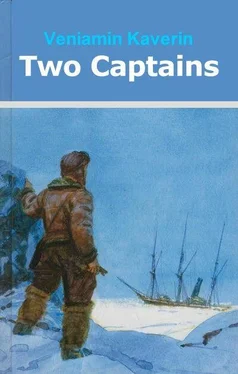I remember our evenings, when, after long, vain attempts to get in touch with the doctor, I caught the first launch that came along and went to Polarnoye, where friends gathered within that circle of light, no matter how late the hour. Who thought of night when the day was night too!
Never before had I talked, drunk and laughed so much. The feeling that had come over me when I first saw Katya here seemed lodged in my heart now for all time-and the whole world went hurtling along. Whither? Who knows! I believed that it was towards happiness.
The three of us-the doctor, Katya and I-spent all our free time studying and sorting the records of the St. Maria expedition.
I don't know which was the more difficult-developing the films or reading the documents of the expedition. A film, as we know, is liable to fade with the years, and that is why the makers usually indicate the date limit after which they cannot guarantee full quality. For the St. Maria films this date was February 1914. Moreover, the metal containers were full of water and the films were soaked through and had evidently been in that condition for years. The Navy's best photographers declared it to be a hopeless case, and even if they (the photographers) were wizards they would never be able to develop the film. I persuaded them to try. As a result, out of hundred and twelve photographs, dried with infinite precautions, about fifty were adjudged "worth further handling". After repeated printings we succeeded in obtaining twenty-two clear pictures.
I had once succeeded in deciphering Navigator Klimov's diary, written in a crabbed, illegible, sprawling hand and smeared with seal-oil. Still they had been separate pages in two bound notebooks. Not so Tatarinov's papers. Apart from his farewell letters, which were better preserved, his papers were found in the form of a compact pulpy mass, and transforming this into a chronometric record, a logbook, maps, charts and survey data, was, of course, beyond my powers. This was done in a special laboratory under expert supervision. No room will be found in this book for a detailed account of what was found in the canvas-bound notebook which Captain Tatarinov had listed among his enclosures. I will only say that he managed to draw deductions from his observations and that the formulas which he put forward enabled us to calculate the speed and direction of the ice drift in any part of the Arctic Ocean. This seems
almost incredible, considering the comparatively short drift of the St. Maria which took place in areas which do not seem to offer any data for such far-reaching deductions. But then the insight of genius does not always need many facts to work upon.
"You have read the life of Captain Tatarinov," I had said to myself, "but its last page has remained sealed."
"This is not the end yet," had been my answer. "Who knows, there may come a time when I shall succeed in turning and reading that page too."
That time had come. I had read it, and found it immortal.
Chapter Six
THE HOME COMING
In the summer of 1944 I was granted leave, and Katya and I decided to spend three weeks in Moscow and the fourth in Ensk, visiting the old folk.
We arrived on July 17-a memorable date. It was the day the huge column of German prisoners-of-war passed through Moscow.
We had light suitcases and so decided to make our way to the centre of the city by Metro, but when we came out of the Metro station on Leningradsky Prospekt we were unable to cross the road for a good two hours. First we stood, then, getting tired, we sat down on our suitcases, then stood up again. And still they came on. The clean-shaven generals with sickly arrogant faces, among whom were some notorious torturers and hangmen, must have been at Krimsky Bridge, miles away, but the soldiers kept on coming and coming, shambling along-some in rags and barefooted, others with their army coats thrown open.
I looked at them with curiosity. Like many other bomber pilots I had never set eyes on the enemy all through the war, unless it was when I dived on to a target-hardly a position from which you can see much. But now I was "in luck"-fifty seven thousand six hundred of the enemy, in ranks of twenty, passed before me in one lot, some of them gazing wonderingly around them at Moscow, which looked its best that radiant day, others staring down at their feet sullen-faced and indifferent.
Men from all walks of life, their every look and gesture were infinitely alien to us.
I glanced at Katya. She was standing with her handbag pressed to her bosom, deeply moved. Suddenly she kissed me tenderly.
"Was that your 'thank you'?" I asked.
"Yes," she answered gravely.
We had lots of money and so took one of the best suites in the hotel Moskva, a sumptuous affair with mirrors, paintings and a grand piano.
At first we were a bit awe-struck, but then found that it was not so very difficult to get accustomed to mirrors, carpets and a ceiling decorated with flowers and cupids. We felt very good in those rooms, which were spacious and wonderfully cosy.
Korablev, of course, came to see us the day we arrived, looking dapper in an embroidered white shirt which, with his smartly twirled moustache, gave him a resemblance to some great Russian painter- exactly which one, Katya and I couldn't for the moment remember.
He had been in Moscow in the summer of 1942 when I had knocked at that felt-covered door of his. He had been in Moscow and nearly went mad when he came home and found my letter telling him that I was going to Yaroslavl to look for Katya.
"How do you like that? To look for Katya, with whom I had gone along to the police station only the day before, because they didn't want to register her at the Sivtsev-Vrazhek flat!"
"Never mind, Ivan Pavlovich," I said. "All's well that ends well. I wasn't very lucky that summer. As a matter of fact I'm glad that we've met now, when everything is really well. I was black, gaunt, and half-crazy, but now you see before you a normal, cheerful man. But tell me about yourself. What are you doing? How are you getting on?"
Korablev was never good at talking about himself. But we did learn from him many interesting things about the school in Sadovo-Triumfalnaya, where events of such great moment in my and Katya's lives had once taken place. With every year that passed after leaving school, it receded from us farther and farther, and we had begun to find it strange that we were once those ardent children to whom life had seemed so bafflingly complicated. But for Korablev school had gone on. Every day he had leisurely combed his moustache before the mirror, picked up his stick, and gone off to give his lessons, and new boys had passed under the searchlight beam of his grave, loving, attentive gaze.
Oh, that gaze of his! I was reminded of Grisha Faber, who had declared that "the gaze is all-important" and that with a gaze like Korablev's he would have "made a career in the theatre in no time".
"Where is he, Ivan Pavlovich?"
"Grisha's in the provinces," Korablev said. "In Saratov. I haven't seen him for some time. I believe he's made good as an actor."
"He was good. I always liked his acting. He shouted a bit, but that doesn't matter. His voice carried, though."
We ran through the whole list of classmates. It was both sad and cheering to recall old friends, whom life had scattered throughout the land. Tania Velichko was an architect building houses in Smolensk, Shura Kochnev was an artillery colonel and had recently been mentioned in dispatches. But there were many of whom Korablev knew nothing either. Time seemed to have passed them by, leaving them in our memories as boys and girls of seventeen.
So we sat, talking, and meanwhile Professor Valentin Zhukov had phoned three times and had been given an earful for keeping us waiting, though he pleaded in excuse some new experiment with his snakes or fox cross-breeds.
Читать дальше












